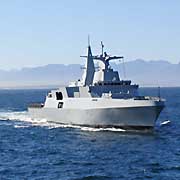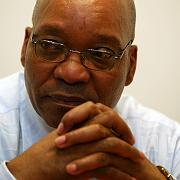Publication: Der Spiegel
Issued:
Date: 2007-02-05
Reporter: Georg Bönisch
Reporter: Markus Dettmer
|
Bribery Allegations Cloud German Ship Sale to South
Africa |
Dubious Defence Deal
Prosecutors in Germany are investigating allegations that a German shipbuilding
consortium paid bribes to South African officials to win a major defense
contract. Internal documents have reinforced suspicions of corruption.
German-made MEKO corvette patrolling the coast of South Africa.
When German state prosecutors
traveled from Dusseldorf to Hamburg last November, there was no need to ask for
directions. They were already familiar with the city's large and confusing port
area.
The investigators had visited the headquarters of German
shipbuilder Blohm+Voss last summer. And just as before, they had a search
warrant concerning a defense contract with South Africa dating back to December
1999.
At the time, the African country ordered four corvettes from the
German Frigate Consortium (GFC), which includes Blohm+Voss, Howaldtswerke
Deutsche Werft AG (HDW) and Thyssen Rheinstahl Technik (TRT). The deal for the
MEKO A200 corvettes was worth around €350 million ($454
million).
Prosecutors have been investigating the deal for the best part
of a year due to suspicions of tax evasion and bribery. TRT listed a sum of $25
million in its balance sheet under the item "Useful Expenditures" related to the
contract. German companies often used that term to describe bribe payments made
abroad which they set off against tax, a practice that became illegal in
February 1999.
The accusations of improper conduct now stretch all the way to the top of the former
management of the firms involved, including an ex-board member of ThyssenKrupp
and a former manager of the Blohm+Voss shipyard.
The paper trail leads half way around the world: from
Germany to South Africa, from London to the Liberian capital Monrovia. The
prosecutors believe they've found documents backing up suspicions that the
German shipbuilders won the South African contract with the help of
kickbacks.
Mysterious $3 million payment
And while the
German public is currently preoccupied with the shroud of corruption enveloping
electronics giant Siemens, several internal memos that appear to document how
employees of the shipbuilders held unofficial talks with the head procurement
officer of the South African military. The high-ranking bureaucrat allegedly
demanded a payment of $3 million at those meetings and in 2000 that sum was indeed transferred to a front company in
London.
A spokesperson for ThyssenKrupp said
there could be "no further information given regarding the situation" in light
of the ongoing investigation, but the company had a "high interest in a complete
clarification." An internal committee was conducting its own inquiry into the
charges "with the help of external experts" and there was "comprehensive"
cooperation with prosecutors.
The corvette deal looks like an example of
what is common practice in major
international deals where business meets politics. It
leads into a shadowy region where it's often difficult to decide which side is seducing which.
The origins of the deal go back to 1993, as the end of
Apartheid and of the international weapons embargo on South Africa were both in
sight. The country's navy decided to make arrangements for the purchase of four
corvettes. The project "Sitron" survived Nelson Mandela's election victory in
1994 and shortly thereafter defense contractors the world over -- including the
German consortium -- began scrambling to win the lucrative deal. By December
1994, the Germans' hopes had already been dashed as the number of countries
still in contention was cut from five to two -- with only Britain and Spain
still in the running.
But the
German consortium made a surprise return to the circle of bidders only four
weeks later, when Mandela's then deputy and current
South African President Thabo Mbeki announced during a January 1995 visit to
Germany: "The race is still open." And in September 1997 the South Africans
started a complex tender process for one of Africa's biggest ever defense
contracts. The country's armed forces were now looking to buy not only warships,
but also submarines, helicopters and airplanes in five separate contracts. By
the end of 1999 the military had purchased around €5 billion worth of European
weapons systems -- a deal that has divided South Africa for years.
The
investigation by the German prosecutors is likely to deepen the controversy.
Allegations of corruption have plagued the South African defense tender since
1999, even though suspicions have not been directed against the German
consortium until now. That's partially due to the special nature of the deal: the foreign
defense contractors agreed to allow South African firms to participate in the
production of the weapons systems.
Allegations against ADS executive,
Zuma
Until recently, investigators had focused their efforts on the
German consortium's South African partner Africa Defense Systems (ADS). In 2005,
a court sentenced ADS head Shabir Shaik to 15 years in prison for corruption
offenses and other charges. The businessman was also the "financial advisor" to
Jacob Zuma, who was vice president of South Africa until 2005. Shaik allegedly
channeled the equivalent of several hundred thousand euros to Zuma so that he
would obstruct corruption investigations into the defense contracts, among other
things. Despite all of the allegations, Zuma is considered one of the leading
candidates to become president in 2008.

Former South African Vice President Jacob Zuma allegedly received payments to
obstruct corruption probes.
He is regarded as a contender for the presidency in
2008.
Former South African Vice President Jacob Zuma allegedly received
payments to obstruct corruption probes. He is regarded as a contender for the
presidency in 2008.
Shaik's name also appears
in German documents. While it's understandable that the managers of the German
consortium held several meetings with the head of their African partner, there
are also indications that the Germans had contact with two brothers of Shaik. In
May 1998 Shamin "Chippy" Shaik, a director at the South African Defense
Ministry, was named Chief of Acquisitions. His new position gave him key influence on the tender process and
procurement decisions.
According to the
shipbuilding consortium's internal memos
now in the possession of prosecutors, the German
bidders had unofficial contacts with Chippy Shaik in 1998. The managers even documented with Teutonic efficiency
the sensitive nature of the meeting. Chippy allegedly demanded payment of $3
million to ensure the success of the German bid for the contract. He supposedly
even named a middleman: Ian Pierce. The South African
businessman holds a stake in a firm called Futuristic Business Solutions (FBS).
The company has been linked to allegations of corruption in South Africa for
years. And FBS also happens to have a stake in the German consortium's partner
ADS.
The German Frigate
Consortium needed all the help it could get during the tender. A joint inquiry by the South African anti-corruption authority,
the country's accounting office and the attorney general concluded that the
shipbuilding consortium and two other firms shouldn't have even made it through
the first round of the tender. The Germans failed to meet several requirements
right up until June 1998. And yet they still won the bid.
On July 27,
1998, German managers from the consortium traveled to South Africa for three
days. Following his return to Germany, the responsible Thyssen executive noted
in a memo the nature of his confidential talks with Chippy Shaik. Among other
matters, the $3 million bribe was allegedly discussed during the meeting. And
indeed, in the same year a lobby agreement for that sum was forged with the
front company Merian Ltd. in London. Ian Pierce allegedly acted as its
representative.
As the South
African government's fiscal year took effect on April 1, 2000, the contract
became valid and the first payments for the corvettes were made to the German
shipbuilding consortium. The front company received $3
million from the Germans in the same month. Neither Shaik nor Pierce responded
to telephone and written requests for a comment last week.
The episode
may be beyond the statue of limitations for criminal legal action in Germany.
And a ThyssenKrupp spokesperson is confident "that the allegations of improper
commission payments will not be proven in the course of the prosecutors'
investigation." But the inquiry is not yet finished and there is evidence of
further payments to several people, firms and foundations in South Africa. By
October 2001, a total of $22 million had been paid to a single company in
Monrovia, Liberia.
Despite the investigation and allegations, the warship
deal remains afloat. The contract for the four corvettes even has an
option for the purchase of a fifth ship
*1. Klaus Borgschulte, head of the Thyssen shipyard
group, even sees "clear signals that the South African navy and defense ministry
are very interested in exercising that
option *2."
With acknowledgements to Georg
Bönisch, Markus Dettmer and Spiegel Online International.
*1 The option
has actually expired, but it appears that mechanisms have been enacted to
re-validate the option.
*2 It is believed that
extra "commission" payments are due by Thyssen-Krupp is the option is
exercised.
This is putting them in a quandry because all eyes in SA and
Germany are watching these perennial wonga splodgers.
But it'll be great
to see Schabir, Chippy, Ian Pierce and Zuma sharing a renal transplant ward at a
private hospital of their choice.
This is one hellova article.


